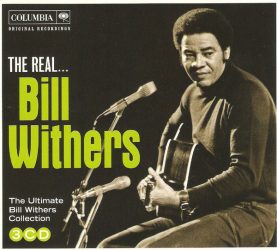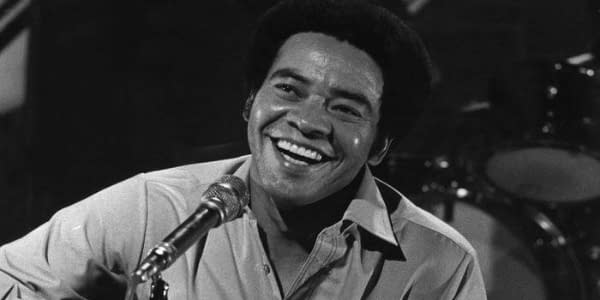Arts Remembrance: The Three Funkiest Handclaps in Music History — An Appreciation of Bill Withers
By Allen Michie
When I think of Bill Withers I think of just three handclaps. It’s my favorite example in his music, or just about anyone else’s, of the power of restraint — not slamming and flailing about to shift a groove into overdrive.

The late singer Bill Withers — his view of life in America was comprehensive.
Bill Withers died today at age 81. It’s a sad statement on our times that it comes as a relief that he died from something other than COVID-19. He died of a heart condition, ironic for a man whose heart was densely packed with the disciplined emotion that came through so powerfully in his music.
Withers is remembered by many, and rightly so, for his sunnier hit records — “Lovely Day,” “Just the Two of Us,” “Lean on Me.” But there was much more to Withers’s comprehensive view of life in America. To pick just one song, listen to the unforgettable “I Can’t Write Left-Handed,” about a war veteran asking for help writing a letter to his mother. “Strange little man over here in Vietnam I ain’t never seen/Bless his heart I ain’t never done nothing to him/He done shot me in my shoulder.”
Withers was about simplicity and directness. He was not about histrionics. He did not come out of the gospel tradition with its elaborate emotive glissandos and dramatic buildups. Instead, he would break traditions by simply holding a note, something practically unheard of in pop music — he held onto the word “day” in “Lovely Day,” for example, for a full 19 seconds. He did not always croon to seduce the ladies. Instead, he often sang about lasting relationships rich with history — the melancholy “I Love You Dawn,” the exuberant “Kissing My Love,” and the domestic epic “Grandma’s Hands.” He didn’t rap with flowing streams of words (although he was famous for his engaging narrative introductions in concert). Instead, he could take a single word or phrase and repeat it for intensity, again something practically unheard of pop music — “I know” is said 26 times in two minutes in “Ain’t No Sunshine.”
When I think of Bill Withers, however, I think of just three handclaps. It’s my favorite example in his music, or just about anyone else’s, of the power of restraint — not slamming and flailing about to shift a groove into overdrive.
It happens in “Use Me.” First, it’s important to listen to the entire song for context. Reversing the usual situation of the woman being used by the man as little more than a sex object (once again, something practically unheard of in pop music), Withers recounts the social, family, and public humiliations of being a boy-toy: “Sometimes/It’s true you really do abuse me/You get me in a crowd of high-class people/Then you act real rude to me.” The background is spare — bass, drums (just high-hat, bass, and rim shots), and an electric keyboard that sounds like a harpsichord (again, something practically unheard of in pop music).
 There’s something about the harpsichord sound that suggests the “high-class people,” but its strong groove and earworm bass line (not actually played on the bass, again, something practically unheard of in pop music) lets you know that there’s something much more earthy waiting when those high-class people leave the room. The harpsichord notably drops out at 1:52, right when Withers gets to the payoff line of the abuse: “But brother, if you only knew/You would wish that you were in my shoes/You just keep on using me/Until you use me up.”
There’s something about the harpsichord sound that suggests the “high-class people,” but its strong groove and earworm bass line (not actually played on the bass, again, something practically unheard of in pop music) lets you know that there’s something much more earthy waiting when those high-class people leave the room. The harpsichord notably drops out at 1:52, right when Withers gets to the payoff line of the abuse: “But brother, if you only knew/You would wish that you were in my shoes/You just keep on using me/Until you use me up.”
Then something happens at 2:52 that is, surprise, something practically unheard of in pop music. There are three handclaps. Not two. Not four. Not 100 in an endless loop. Not an even number, and they don’t happen on the second and fourth beat of the measure. The effect is subtly powerful, and it is hip as hell.
Withers has been restrained, as usual. He’s been reasonable with his friends and his brother, rejecting their good advice. But their arguments to leave the abusing lady have the opposite effect: it just brings her to mind, and the repressed sexual tension in Withers’s voice only grows. The key third chorus begins with Withers singing the word “sometimes” a full octave up to express desperation, then he snakes it back down the blues scale to a humble “it’s true you really do abuse me.” He more speaks than sings the line “You get me in a crowd of high-class people/Then you act real rude to me.” The cork is in.
Then the cork comes out. “Unh huh but ooh baby! / CLAP! /Baby!/ CLAP!/ Baby baby!/ CLAP! /When you love me I can’t get ENOUGH!” The groove intensifies, if that’s even possible, and Withers slithers and slides into “But I want to spread the news/That if it feels this good gettin’ used/You can keep on using me…/Until you use me up.”
Something happens during those three handclaps. There’s a reason why they are where they are and not somewhere else. The only parallel I can think of is in Marvin Gaye’s “Let’s Get It On,” where the handclaps come in at 4:20 in a 4:51 song, right after the word “sanctified.” Suddenly, sex becomes church, or vice versa.
Ordinary handclaps on boring old two and four are routine; too often they are just there for hokey audience participation. But here there are only three handclaps. They aren’t for you, and Withers isn’t asking you to join in. They aren’t exactly on beats two and four — they are syncopated, as if they are aimed at beats two and four as expected but he just couldn’t hold back long enough. It has to be said — they are sexual. They are the rhythms of a head jerking back in orgasm. They’re keyed to the lyrics Baby! Baby! Baby baby! When I love you I can’t get ENOUGH!
With Prince, Barry White, Luther Vandross, Marvin Gaye, and so many others, it wouldn’t quite work. They’re always already sexual. They can read from the phone book and it would sound sexy. But Withers isn’t like that — he’s cool, he’s restrained, and he simmers. He saves a shout until he means it.
I discussed the three funky handclaps with a professional music theory teacher, Anna Brock, trying to figure out exactly how they work and how they would be notated. Simply listening to them, they sound effortless, natural, and inevitable. But they’re deceptively complicated. We struggled for an hour to work it out. We slowed the track down to half speed (which helped, and by the way was STILL funky and even more darkly seductive).

Bill Withers. Part of his genius is that he saved a shout until he meant it.
Brock divided the “But baby, baby baby” measure at 2:41 into sixteenth notes and tried to pin the claps down. The first one is simple enough and arrives on the fifth sixteenth note, or the second of the four beats of the measure. But the second clap isn’t on the thirteenth sixteenth note, or the fourth beat of the measure, where you would expect it to land. It comes two sixteenth notes sooner than that, and not exactly on the beat. The second clap comes in on the eleventh sixteenth note (again, something practically unheard of in pop music). There’s a snare drum rimshot on the tenth sixteenth note that gives it a tiny little kick into place, providing that syncopated jerking sensation.
The third handclap happens in the measure that goes with “When you love me I can’t get e-“. Divided into sixteenth notes, the clap comes right where it’s supposed to — on the fifth sixteenth note, right on top of the second beat of the measure. But it doesn’t sound that way. The genius of the three handclaps is that the displacement of the second handclap just two sixteenth notes ahead of schedule makes the third handclap sound like it’s late, which it isn’t. It’s used up. But it feels good getting used.
Brock said that the best way to describe the three funkiest handclaps in music history is as a “hemiola.” This is not a medical condition. It’s three beats of equal value in the time normally occupied by two beats. It’s not exactly what Withers does here, so Brock clarified that it’s more like an “implied hemiola.”
Three perfect handclaps from us all for the life and career of Bill Withers.
Allen Michie works for the state of Texas in higher education administration. He has a PhD in English from Emory University and is the author of several scholarly works. He writes articles to work out personal issues such as why he feels compelled to collect Bert Kaempfert 45s.

This makes me so happy. Before I read the piece, having just read the headline, I already knew exactly what Michie MUST be talking about, because those handclaps are maybe the best claps in popular music. They are momentarily-take-both-hands-off-the-wheel-to-clap-along-while-you’re-driving claps. Earlier today, I was making lunch while listening to “Use Me,” a song I include on just about every playlist I ever make for any occasion,” dancing and singing and clapping along. Glad to learn I’m not alone in this particular obsession.
I completely agree, Carrie. I know now it’s best not to listen to “Use Me” while driving, or while shaving with a razor (long story).
Luv the article! And like Carrie, knew I had to read this article about Bill’s amazing, stand-out career over all the others I passed by, simply because of the title! My Dad was a musician so I grew up w/ music and fortunately was a teen during Bill’s era. What talent. A cool cat as they say. And I got bragging rights….I brag whenever I can that you’re from my home state of WV. Groove on, Mr. Withers.
I enjoyed reading your joint effort at rhythmic analysis with your musician friend, so I became curious and offer my own.
What’s interesting and apparent to me is how the hand claps are each connected (and done in reaction) to the word Baby. It’s always “Ba-by-clap”, ie. 3 successive 8th notes. The first two Ba-by-clap’s happen right in a row but then Withers syncopates (delays) the 3rd “Ba-by-clap” a full beat, by adding one additional, off-beat, “ba-by” for added emphasis. So cool! Why might this be informative? Because it’s the word Baby, not the clap, that anchors the phrase, giving context to why the claps are where they are. Great article on a great artist!
As an aside, there exists in Brazilian music a very common musical component, known as Partido Alto (literally the middle part) that is rhythmically almost exactly what Bill Withers sings at this moment. Though not precisely the same, both are constructed with two on-beat phrases plus a single off-beat phrase.
Agreed, there’s some kind of Brazilian sound to the syncopated hand claps. Withers sounds great on Grover Washington “Just the Two of Us,” which has a light samba feel.
I don’t think the third handclap is delayed—it falls right on the two, which is where you’d expect it to be (handclaps are almost always on beats 2 & 4). It just feels like it’s delayed because the second handclap comes early!